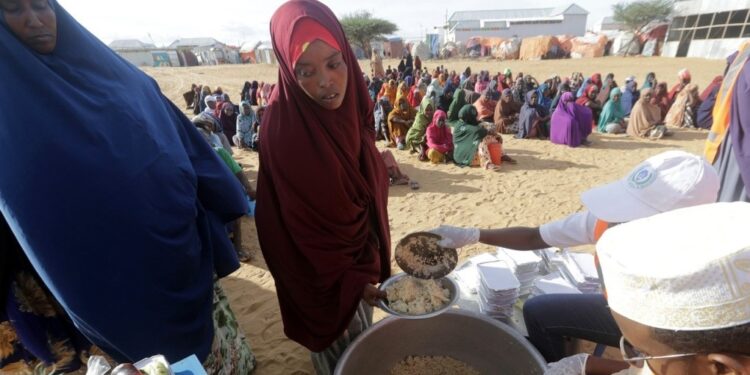Printed March 29, 2023 9:34 a.m. ET
Up to date March 29, 2023 9:37 a.m. ET
Native NGO prepares Iftar meals for folks at an internally displaced folks camp on the outskirts of Mogadishu, Somalia, Friday, March 24, 2023. This 12 months’s holy month of Ramadan coincides with the longest drought on document in Somalia. (AP Photograph/Farah Abdi Warsameh)
MOGADISHU, Somalia (AP) — This 12 months’s holy month of Ramadan coincides with the longest drought on document in Somalia. Because the solar units and Muslims world wide collect to interrupt their every day fasts with beneficiant dinners, Hadiiq Abdulle Mohamed and her household have simply water and no matter meals could be at hand.
Mohamed is amongst greater than 1 million Somalis who’ve fled their properties searching for assist whereas an estimated 43,000 folks died final 12 months alone. She and her husband and their six youngsters now take refuge in one of many rising displacement camps across the capital, Mogadishu.
Ramadan introduced a rise in meals costs for a rustic already fighting inflation triggered partially by Russia’s invasion of Ukraine and the withering of native crops by 5 consecutive failed wet seasons. Thousands and thousands of livestock which can be central to folks’s diets have died.
Now meals is even more durable to return by for these displaced. For Ramadan, Mohamed and her household depend on well-wishers to supply their single meal a day. First, they break their quick with water and items of dates, then spoons of rice. Lastly, they eat the donated meal of rice cooked with blended meat, bruised banana and a small plastic bag of juice, which Mohamed waits in line for hours below the searing solar to acquire.
“I recall the Ramadan quick we had up to now after we had been having fun with and prospering,” she mentioned. “We might milk our goats, prepare dinner the ugali (maize porridge) and collard greens and drink water from our catchment. Nevertheless, this 12 months we live in a camp, with out plastic to cowl us from rain, with out meals to eat, thirsty and experiencing drought. We have now this small sizzling meal, however do you assume that this may feed a household of six youngsters, plus a mom and father? That isn’t potential.” The household as soon as was affluent and owned farmland and goats in a village about 140 kilometers (87 miles) west of the capital. Now they attempt to get by on the little cash her husband makes by carrying items in a wheelbarrow. However meals costs have soared a lot that his revenue is now not sufficient to purchase a 1 kilogram (2.2 pound) bag of rice.
The inflation in Somalia pinches the more comfortable, too. The everyday Ramadan fast-breaking meal consists of samosas and different snacks; juice and tea and occasional; the primary dish of rice or spaghetti or flatbread with camel, goat, hen or fish; and eventually, dessert.
The Horn of Africa nation imports nearly all of its meals, from Ukraine-grown wheat to the bottles of Mountain Dew stocked in some gleaming Mogadishu retailers. In the meantime, costs of fundamentals like rice and cooking oil proceed to rise in elements of the nation.
This month, World Meals Program monitoring reported that offer chain resilience was typically good in Somalia, however the spike in demand for Ramadan could be “an obstacle to susceptible households who depend upon native markets.”
“We’re actually experiencing a hovering value of meals and one other primary commodities,” mentioned Ahmed Khadar Abdi Jama, a lecturer in economics at Somalia College. “Every time there’s an exterior issue that may cut back the provision of meals, such because the Russia-Ukraine battle, it’s extra seemingly that Somalis will really feel a low provide.”
For instance, a kilogram of camel meat that value about $4 earlier than the holy month now prices about $6. However this inflation will subside after the month is over, Khadar mentioned.
Ramadan is a month of alms and forgiveness all through the Muslim world. With the rising variety of Somalis displaced by the drought, the imams of the mosques in Mogadishu are main efforts to encourage the town’s rich and others who can afford it to sympathize with the poor and provides generously.
“Some folks want meals to afford to interrupt their quick,” mentioned one imam, Sheikh Abdikarim Isse Ali. “Please assist them.”
___
Cara Anna in Nairobi, Kenya, contributed.









